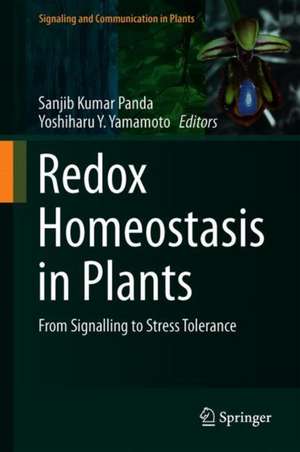Redox Homeostasis in Plants: From Signalling to Stress Tolerance: Signaling and Communication in Plants
Editat de Sanjib Kumar Panda, Yoshiharu Y. Yamamotoen Limba Engleză Hardback – 7 mai 2019
This book summarizes the latest research results on the role of reactive oxygen species (ROS) in plants, particularly in many abiotic stresses, and their regulation. Redox homeostasis refers to maintaining a balance of oxidised and reduced state of biomolecules in a biological system for all-round sustenance. In a living system, redox reactions contribute to the generation of reactive oxygen species (ROS), which act as signalling molecules for developmental as well as stress-response processes in plants. It is presumed that, being sessile and an aerobe requiring oxygen for mitochondrial energy production, as well as producing oxygen during photosynthesis, the redox homeostasis process is more complex and regulated in plants than in animals. Any imbalance in the homeostasis is mainly compensated for by the production of various ROS molecules, which, though they can cause severe oxidative damage in excess, can also ideally act as signalling molecules.
Din seria Signaling and Communication in Plants
- 24%
 Preț: 793.47 lei
Preț: 793.47 lei - 24%
 Preț: 1208.95 lei
Preț: 1208.95 lei - 18%
 Preț: 1118.13 lei
Preț: 1118.13 lei - 24%
 Preț: 783.53 lei
Preț: 783.53 lei - 18%
 Preț: 1111.53 lei
Preț: 1111.53 lei - 18%
 Preț: 998.34 lei
Preț: 998.34 lei - 18%
 Preț: 1545.57 lei
Preț: 1545.57 lei - 18%
 Preț: 1547.81 lei
Preț: 1547.81 lei - 18%
 Preț: 951.29 lei
Preț: 951.29 lei - 24%
 Preț: 796.83 lei
Preț: 796.83 lei - 18%
 Preț: 942.63 lei
Preț: 942.63 lei - 18%
 Preț: 1219.77 lei
Preț: 1219.77 lei - 18%
 Preț: 954.31 lei
Preț: 954.31 lei - 18%
 Preț: 953.20 lei
Preț: 953.20 lei - 18%
 Preț: 1388.05 lei
Preț: 1388.05 lei - 18%
 Preț: 956.50 lei
Preț: 956.50 lei - 18%
 Preț: 942.63 lei
Preț: 942.63 lei - 18%
 Preț: 943.73 lei
Preț: 943.73 lei - 24%
 Preț: 1053.39 lei
Preț: 1053.39 lei - 18%
 Preț: 941.48 lei
Preț: 941.48 lei - 18%
 Preț: 943.57 lei
Preț: 943.57 lei - 18%
 Preț: 943.43 lei
Preț: 943.43 lei - 18%
 Preț: 944.51 lei
Preț: 944.51 lei - 18%
 Preț: 945.30 lei
Preț: 945.30 lei - 18%
 Preț: 1221.07 lei
Preț: 1221.07 lei - 18%
 Preț: 944.19 lei
Preț: 944.19 lei - 18%
 Preț: 948.92 lei
Preț: 948.92 lei
Preț: 641.71 lei
Preț vechi: 754.95 lei
-15% Nou
Puncte Express: 963
Preț estimativ în valută:
122.79€ • 128.55$ • 101.60£
122.79€ • 128.55$ • 101.60£
Carte disponibilă
Livrare economică 17-31 martie
Preluare comenzi: 021 569.72.76
Specificații
ISBN-13: 9783319953144
ISBN-10: 3319953141
Pagini: 260
Ilustrații: VIII, 198 p. 39 illus., 17 illus. in color.
Dimensiuni: 155 x 235 mm
Greutate: 0.45 kg
Ediția:1st ed. 2019
Editura: Springer International Publishing
Colecția Springer
Seria Signaling and Communication in Plants
Locul publicării:Cham, Switzerland
ISBN-10: 3319953141
Pagini: 260
Ilustrații: VIII, 198 p. 39 illus., 17 illus. in color.
Dimensiuni: 155 x 235 mm
Greutate: 0.45 kg
Ediția:1st ed. 2019
Editura: Springer International Publishing
Colecția Springer
Seria Signaling and Communication in Plants
Locul publicării:Cham, Switzerland
Cuprins
Redox regulation of proteins.- Advances in Chlorophyll Fluorescence Theories: Close Investigation into Oxidative Stress and Potential Use for Plant Breeding.- ROS and Fe homeostasis in Plants.- Hydrogen peroxide as a signaling molecule for broad stress responses.- Ascorbate Peroxidases: Scavengers or sensors of hydrogen peroxide Signaling.- Redox Homeostasis in Plants under Arsenic Stress.- Role of reactive oxygen species homeostasis in root development and rhizotoxicity in plants.- microRNAs-mediated redox homeostasis in plants under oxidative stress.- A review on water stress and redox regulation with emphasis on future biotechnological prospects.- Interactions between circadian rhythms, ROS and redox.- ROS and Heat stress.
Textul de pe ultima copertă
This book summarizes the latest research results on the role of reactive oxygen species (ROS) in plants, particularly in many abiotic stresses, and their regulation. Redox homeostasis refers to maintaining a balance of oxidised and reduced state of biomolecules in a biological system for all-round sustenance. In a living system, redox reactions contribute to the generation of reactive oxygen species (ROS), which act as signalling molecules for developmental as well as stress-response processes in plants. It is presumed that, being sessile and an aerobe requiring oxygen for mitochondrial energy production, as well as producing oxygen during photosynthesis, the redox homeostasis process is more complex and regulated in plants than in animals. Any imbalance in the homeostasis is mainly compensated for by the production of various ROS molecules, which, though they can cause severe oxidative damage in excess, can also ideally act as signalling molecules.
Caracteristici
Provides information on reactive oxygen species (ROS) in plants Describes the role of ROS in many abiotic stresses Written by an international board of authors
